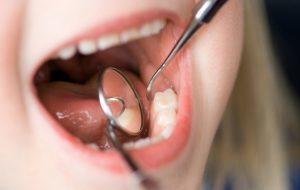 Leo Briggs, deputy head of the DDU, says dental professionals have a critical role in ensuring periodontal problems are picked up.
Leo Briggs, deputy head of the DDU, says dental professionals have a critical role in ensuring periodontal problems are picked up.
The typical symptoms of periodontal disease can be easy to miss until it’s too late to treat them effectively. This means that dental professionals have a critical role in monitoring patients’ periodontal health.
Unfortunately, this is one aspect of dental practice that is not always given the attention it deserves. Which is surprising when you consider that around 45% of the adult dentate population in England, Wales and Northern Ireland have periodontal pocketing exceeding 4mm and just under 10% have advanced periodontal disease, which can eventually lead to tooth loss.
Periodontal allegations
Allegations of failure to diagnose or treat periodontal disease now account for about 10% of claims notified to the Dental Defence Union (DDU) each year. Between 2008 and 2012 we paid out over £2.8m in compensation and a similar amount in legal fees on behalf of members for claims involving periodontal disease.
These allegations can be difficult to defend if there is no evidence that the dental professional has carried out a basic periodontal examination during check-ups or provided the patient with appropriate advice. The majority of periodontal claims lead to compensation being paid to the patient – more so than for several other types of treatment such as extractions.
Unfortunately, if not picked up early enough, periodontal disease can also mean expensive remedial treatment for the patient such as implants. This is because patients frequently report bone and teeth loss as a result of the disease being undiagnosed. Patients may also need additional visits to the hygienist or even periodontal surgery to stabilise their condition. As a result, compensation paid to the patient can run into the tens of thousands of pounds, which is generally higher than for claims following cosmetic procedures or root canal treatment.
Common allegations in the cases we see include failure or delay in diagnosis and poor management, once the condition was diagnosed. Incomplete or inaccurate records were also a common theme, which can make it more difficult for the dental professionals concerned to monitor the patient’s progress or to appreciate a marked deterioration. However, failure to record relevant details of the treatment plan and the advice given would also make it significantly more difficult to challenge the patient’s version of events.
Diagnosing periodontal disease quickly
There are steps dental professionals can take to minimise the risk of a delay in diagnosis of periodontal disease, or problems in treatment. They include being aware of and following available national guidance to ensure your treatment is based on authoritative guidance. For example, the British Society of Periodontology’s (BSP) guidance on the Basic Periodontal Examination (BPE). The BSP also has a Good Practitioner’s Guide, which identifies risk factors for the disease as well as providing further advice on diagnosis and prevention.
Clearly and fully record your examination findings. Include the patient’s BPE scores and your assessment of their periodontal health, along with factors like the presence of plaque and calculus that make them susceptible to periodontitis and which will need close examination at future appointments.
It’s also important to warn the patient if they are at risk of periodontal disease and explain how they can take action. This could include providing advice on good oral hygiene, stopping smoking and the frequency of visits needed for treatment. Make a note of the conversation.
If you decide that a patient’s gum disease only requires monitoring and advice at this stage, you should still explain this to them and record your discussion and their consent to your treatment plan in the records.
Take time to explain the risks and benefits of all treatment options, as well as the consequences if no treatment is provided. Make a careful note of what you discussed and the patient’s agreement in the clinical records. Recognise the limits of your own clinical skills and be prepared to refer the patient to a specialist if their condition does not improve despite treatment.
By carefully monitoring patient’s gum health according to national guidance, and providing at risk patients with relevant advice, dental professionals can help to minimise experiencing some of the dento-legal problems associated with periodontitis.
For more information on how the DDU can help, visit www.theddu.com, call the dento-legal helpline on
0800 374 626 or email [email protected].


